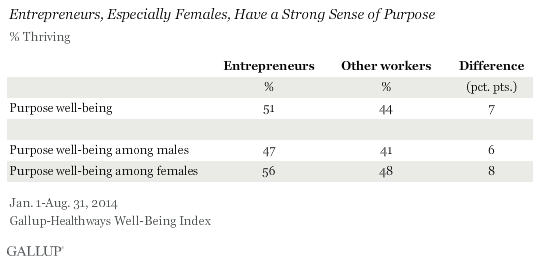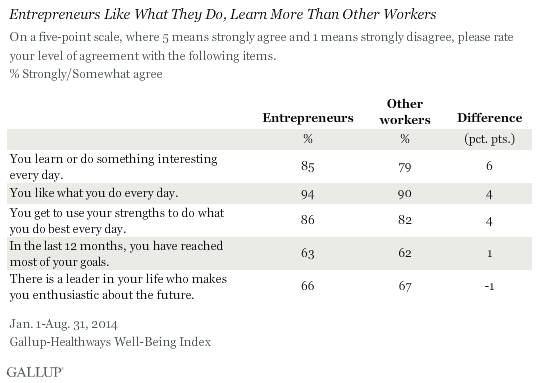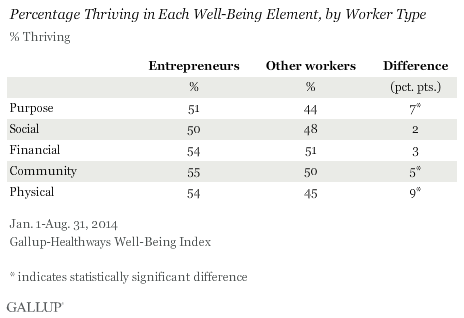This article is part of a weeklong series, "Entrepreneurs and Strengths," on Gallup.com.
WASHINGTON, D.C. -- In the U.S., entrepreneurs are more likely to be thriving in purpose well-being than other workers (51% vs. 44%, respectively). This is especially true for female entrepreneurs, who are more likely to have strong purpose (56%) than male entrepreneurs (47%) and other female workers (48%).

Importantly, these findings hold true even when taking into account age, race/ethnicity, region, income, education, marital status, and weekly hours worked. This means that these demographic factors alone don't account for entrepreneurs' higher purpose well-being; rather, there is something else about being an entrepreneur that relates to liking what they do each day and being motivated to achieve their goals.
These findings are based on interviews with more than 1,200 entrepreneurs and 51,000 other employed adults from Jan. 1-Aug. 31, 2014, as part of the Gallup-Healthways Well-Being Index. Gallup classifies entrepreneurs based on their self-identification as both "self-employed" and "business owner." Other workers include both full- and part-time workers.
The Gallup-Healthways Well-Being Index measures five elements of well-being -- purpose, social, financial, community, and physical. The purpose well-being element consists of questions about learning or doing something interesting each day, liking what you do, using your strengths, achieving goals, and having a leader who makes you enthusiastic about the future.
Entrepreneurs lead other workers in purpose well-being because they are more likely to agree that every day they learn or do something interesting, like what they do, and get to use their strengths to do what they do best.

Entrepreneurs are no more likely than other workers to agree that they have reached most of their goals in the past 12 months, or that they have a leader who makes them enthusiastic about the future. Employed women are more likely than employed men to agree with these items, regardless of whether they are entrepreneurs.
It seems that female entrepreneurs get an added boost in purpose well-being compared with male entrepreneurs, as they are more likely to say they have a leader who makes them enthusiastic about the future, and that they have achieved most of their goals.
Entrepreneurs Have Higher Physical, Community Well-Being
Entrepreneurs are more likely than other workers to be considered thriving in three out of five elements of well-being. In addition to having higher purpose well-being, entrepreneurs also have higher physical and community well-being. They are just as likely as other workers to be thriving in social and financial well-being.

Similar to the pattern seen for purpose well-being, female entrepreneurs (62%) are significantly more likely than male entrepreneurs (46%) and other female workers (48%) to be thriving in physical well-being. Male and female entrepreneurs are similarly likely to be thriving in social, financial, and community well-being.
Gallup previously found in 2012 that entrepreneurs were less likely than other workers to have health insurance -- but entrepreneurs were also less likely to have been diagnosed with chronic health conditions like obesity, high cholesterol, and diabetes. The 2014 results showing that entrepreneurs are more likely than other workers to be thriving in physical well-being suggests that this is still true.
In terms of community well-being, the thriving gap between male entrepreneurs and male workers (six percentage points) is larger than it is between female entrepreneurs and female workers (four points). This indicates that being an entrepreneur may help males more than females feel engaged with their communities.
Implications
Entrepreneurs are more likely to be thriving than other workers in three of the five well-being elements -- purpose, physical, and community. Female entrepreneurs, in particular, seem to gain a well-being edge in the areas of physical and purpose well-being. Majorities of female entrepreneurs are thriving in both of these elements, which is untrue for male entrepreneurs or other female workers.
One possible explanation for these findings is that the same characteristics that help entrepreneurs start their own businesses -- such as determination, drive, and creative thinking -- may also increase their chances of having high well-being in those three elements. Perhaps individuals with high well-being in these elements are more likely to be predisposed to entrepreneurial pursuits. Or it may be that starting and owning a business, in itself, improves entrepreneurs' well-being, whether by further connecting them to their communities or by allowing them to learn or do something interesting every day. Regardless of the direction of the relationship, entrepreneurship is correlated with higher well-being, reinforcing the need to identify individuals who have entrepreneurial strengths and help them develop their talents.
Survey Methods
Results are based on telephone interviews conducted as part of the Gallup-Healthways Well-Being Index survey Jan. 1- Aug. 31, 2014, with a random sample of 52,386 adults, aged 18 and older, employed full or part time, living in all 50 U.S. states and the District of Columbia.
For results based on the total sample of workers, the margin of sampling error is ±1 percentage point at the 95% confidence level.
For results based on the sample of 1,239 entrepreneurs (those who are self-employed and own a business), the margin of sampling error is ±4 percentage points at the 95% confidence level.
For results based on the total sample of 544 female entrepreneurs, the margin of sampling error is ±6 percentage points at the 95% confidence level.
Interviews are conducted with respondents on landline telephones and cellular phones, with interviews conducted in Spanish for respondents who are primarily Spanish-speaking. Each sample of national adults includes a minimum quota of 50% cellphone respondents and 50% landline respondents, with additional minimum quotas by time zone within region. Landline and cellular telephone numbers are selected using random-digit-dial methods. Landline respondents are chosen at random within each household on the basis of which member had the most recent birthday.
Samples are weighted to correct for unequal selection probability, nonresponse, and double coverage of landline and cell users in the two sampling frames. They are also weighted to match the national demographics of gender, age, race, Hispanic ethnicity, education, region, population density, and phone status (cellphone only/landline only/both, and cellphone mostly). Demographic weighting targets are based on the most recent Current Population Survey figures for the aged 18 and older U.S. population. Phone status targets are based on the most recent National Health Interview Survey. Population density targets are based on the most recent U.S. census. All reported margins of sampling error include the computed design effects for weighting.
In addition to sampling error, question wording and practical difficulties in conducting surveys can introduce error or bias into the findings of public opinion polls.
For more details on Gallup's polling methodology, visit www.gallup.com.
